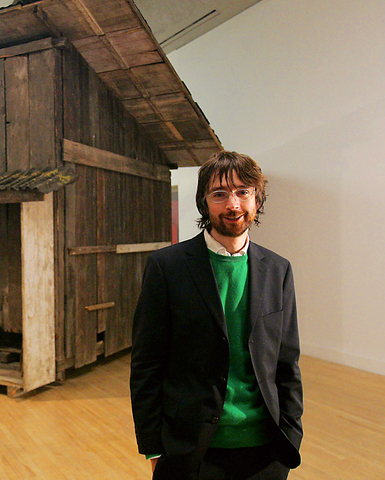An artist who has said of himself, "I have a bad record with destroying things," has won this year's Turner prize.
Simon Starling is no provocateur. Nor was he a shock winner -- the bookies made him the even-money favorite. But none the less, it will come as no surprise to those who regard the Turner prize with disdain that the softly spoken, slightly geekish, rather skeletal figure of Starling has won £25,000 (US$43,000) for dismantling and assembling a wooden shed.
Starling, who was born in 1967, found it on the banks of the Rhine, took it apart, made parts of it into a boat, and used the vessel to carry the remaining parts of it downriver to Basle. It was then reassembled as a shed in a Swiss museum.

PHOTO: AP
The display of his work at the Turner prize exhibition at Tate Britain in London also includes a makeshift motorized bicycle, which Starling used to ride across the Tabernas desert in southern Spain.
It was powered by hydrogen in lightweight canisters that reacted with oxygen in the atmosphere to produce water as a byproduct. The artist used that in turn to paint a simple watercolor of a cactus he found en route. The watercolor is installed alongside the oversize, makeshift bike.
Starling calls his work a "physical manifestation of a thought process." According to Tate curator Rachel Tant. "He's interested in the creation of objects; he is a researcher, traveler, narrator. He looks at how things got to be the way they are and reasserts a human connection between processes we take for granted."
The prize was awarded on Monday by UK arts minister David Lammy, at a ceremony which one prominent artist referred to as a "school dinner for the British artworld." Lammy said of the prize: "Its true genius is that for a couple of days every year, everyone gets to be an expert, no matter what they think about art."
Traditionalists will be disappointed that the only painter (and, as it happens, the only woman) on the shortlist was denied the top prize. London-based Gillian Carnegie, an early bookies' favorite, apparently paints in an academic style, producing landscapes and portraits. But her works, though they look at first comfortingly old- fashioned, are often disturbing on second view.
Jim Lambie was the artist who many artworld insiders favored to win -- though one distinguished sculptor has dismissed him as a "glorified interior decorator." Whereas last year's Turner prize winner, Jeremy Deller, infuriated some by announcing that he could neither paint nor draw, Lambie has drawn criticism for saying he loved drawing and painting as an art student, but now prefers to stick vinyl tape on floors and make oversize versions of kitsch ornaments.
A gentle, banal piano melody accompanies the installation by Darren Almond, which, with its film of his grandmother watching the dancing in the ballroom at Blackpool and film of a gently bubbling fountain provide, is according to Tant, "a space where everybody can tap into their own memories."
Starling's work is an enjoyable, nomadic, shaggy-dog conceptualism, the trace of a very peculiar way of negotiating the world; but one which, in terms of contemporary art, is also an example of perfect product placement.

On April 26, The Lancet published a letter from two doctors at Taichung-based China Medical University Hospital (CMUH) warning that “Taiwan’s Health Care System is on the Brink of Collapse.” The authors said that “Years of policy inaction and mismanagement of resources have led to the National Health Insurance system operating under unsustainable conditions.” The pushback was immediate. Errors in the paper were quickly identified and publicized, to discredit the authors (the hospital apologized). CNA reported that CMUH said the letter described Taiwan in 2021 as having 62 nurses per 10,000 people, when the correct number was 78 nurses per 10,000

As we live longer, our risk of cognitive impairment is increasing. How can we delay the onset of symptoms? Do we have to give up every indulgence or can small changes make a difference? We asked neurologists for tips on how to keep our brains healthy for life. TAKE CARE OF YOUR HEALTH “All of the sensible things that apply to bodily health apply to brain health,” says Suzanne O’Sullivan, a consultant in neurology at the National Hospital for Neurology and Neurosurgery in London, and the author of The Age of Diagnosis. “When you’re 20, you can get away with absolute

May 5 to May 11 What started out as friction between Taiwanese students at Taichung First High School and a Japanese head cook escalated dramatically over the first two weeks of May 1927. It began on April 30 when the cook’s wife knew that lotus starch used in that night’s dinner had rat feces in it, but failed to inform staff until the meal was already prepared. The students believed that her silence was intentional, and filed a complaint. The school’s Japanese administrators sided with the cook’s family, dismissing the students as troublemakers and clamping down on their freedoms — with

As Donald Trump’s executive order in March led to the shuttering of Voice of America (VOA) — the global broadcaster whose roots date back to the fight against Nazi propaganda — he quickly attracted support from figures not used to aligning themselves with any US administration. Trump had ordered the US Agency for Global Media, the federal agency that funds VOA and other groups promoting independent journalism overseas, to be “eliminated to the maximum extent consistent with applicable law.” The decision suddenly halted programming in 49 languages to more than 425 million people. In Moscow, Margarita Simonyan, the hardline editor-in-chief of the